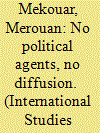| Srl | Item |
| 1 |
ID:
133930


|
|
|
|
|
| Publication |
2014.
|
| Summary/Abstract |
Following the Tunisian revolution of 2011, Arab countries witnessed different degrees of revolutionary diffusion. While some countries experienced a process of advanced diffusion, others experienced more limited forms of emulation. This paper examines the process of regional diffusion that occurred in North Africa during the first half of 2011 to show that shifts by local political agents explain these differences. Using the rich literature of informational cascades, this paper investigates the cases of Algeria, Egypt, Libya, and Morocco to demonstrate that in all four countries, local political agents actively nourished or hindered the process of revolutionary diffusion that followed the Tunisian revolution. In Egypt, the strong involvement of upper-middle-class youth traditionally close to the regime signaled to the general population the presence of a historical opportunity for contestation and helped precipitate the 2011 revolution. The same logic occurred in Libya where defections of important senior members of Gadhafi's regime signaled to the Libyan population that major local actors were also dissatisfied with the leadership of the country. In contrast, major actors in Algeria and Morocco refused to mobilize against their respective governments, thus depriving nascent local demonstrations of both the visibility and the resources necessary for the inception of an informational cascade. Without a shift from local political agents, the process of regional diffusion came to an abrupt end in these two countries.
|
|
|
|
|
|
|
|
|
|
|
|
|
|
|
|
| 2 |
ID:
156614


|
|
|
|
|
| Summary/Abstract |
The quick unraveling of authoritarian systems specifically designed to bear social pressure during revolutions is puzzling. Building on the 2011 Tunisian revolution, this article analyzes the collapse of the police apparatus during the 2011 revolution. In line with Way and Levitsky's study of authoritarian collapse, this article shows that the low cohesion and low scope of the security forces is one of the main factors explaining the rapid collapse of one of the Arab world's seemingly most solid repressive systems. At the theoretical level, this article will demonstrate that preference falsification is a double-edged sword. On the one hand, it can nourish authoritarian resilience. On the other, it can also weaken repressive regimes by making core members of the regime overestimate the loyalty of the low-ranking members of the security apparatus.
|
|
|
|
|
|
|
|
|
|
|
|
|
|
|
|